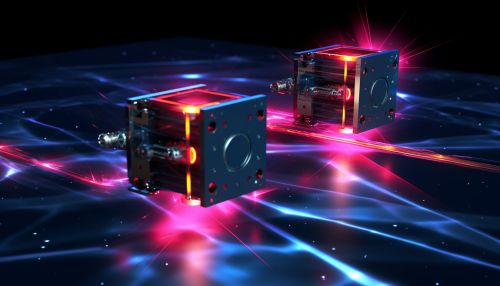Quantum Cryptography and Network Security
Introduction
Quantum cryptography is a branch of cryptography that utilizes the principles of quantum mechanics to secure communication. It enables the creation of cryptographic systems that cannot be easily compromised without alerting the communicators. This field is a sub-discipline of quantum computing, and it has significant implications for network security.


Quantum Mechanics and Cryptography
Quantum mechanics is a fundamental theory in physics that describes the physical phenomena at the microscopic scale of atoms and subatomic particles. It introduces concepts such as superposition and entanglement, which are key to understanding quantum cryptography.
Superposition
In quantum mechanics, superposition refers to the ability of a quantum system to be in multiple states at the same time until it is observed or measured. This property is used in quantum cryptography to create quantum bits, or qubits, that can hold more information than classical bits.
Entanglement
Quantum entanglement is another phenomenon in quantum mechanics where two or more particles become linked and the state of one particle can instantaneously affect the state of the other, no matter the distance between them. This property is used in quantum cryptography for secure key distribution.
Quantum Cryptography
Quantum cryptography uses the principles of quantum mechanics to secure data transmission. The most well-known application of quantum cryptography is Quantum Key Distribution (QKD).
Quantum Key Distribution
Quantum Key Distribution (QKD) is a method of transmitting cryptographic keys between two parties using a quantum channel. The security of QKD comes from the fundamental properties of quantum mechanics, particularly the fact that any measurement of a quantum system disturbs the system. This means that any eavesdropper trying to intercept the key would be detected.
Quantum Cryptography and Network Security
Quantum cryptography has significant implications for network security. It can provide a high level of security for data transmission over networks, making it nearly impossible for eavesdroppers to intercept data without detection.
Quantum Networks
A quantum network is a network that uses quantum signals instead of classical signals for communication. Quantum networks can provide secure communication channels, thanks to the principles of quantum cryptography.
Quantum Internet
The quantum internet is a proposed future version of the current internet, where information would be stored, processed, and transmitted in a quantum manner. Quantum cryptography would play a crucial role in securing the quantum internet.
Challenges and Future Directions
Despite its potential, quantum cryptography faces several challenges. These include technological hurdles, such as the difficulty of maintaining quantum states over long distances, and theoretical challenges, such as the need for new cryptographic protocols that can exploit the full potential of quantum mechanics.
Nevertheless, the field of quantum cryptography is rapidly advancing, and it holds great promise for the future of network security. Researchers are continually developing new techniques and technologies to overcome these challenges, and the advent of the quantum internet could revolutionize the way we communicate and secure our data.
